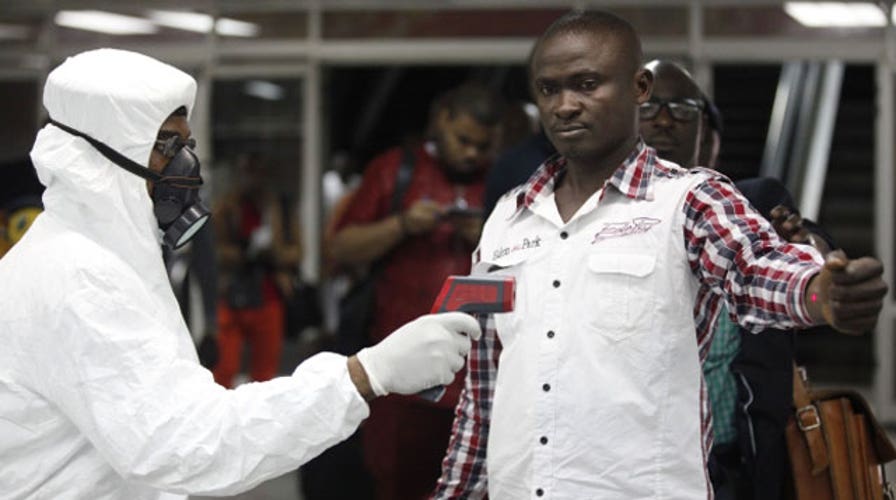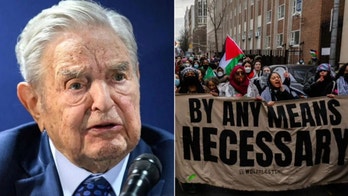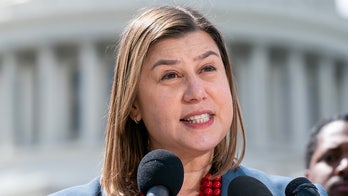Should air travel from Ebola hot zones be restricted?
Jonathan Serrie reports from Atlanta, Georgia
WASHINGTON – After major airlines jumped to suspend flights and take other precautions in response to the Ebola outbreak, the U.S. government is starting to catch up -- ramping up efforts to keep the deadly virus from spreading.
The announcement this week by the Centers for Disease Control and Prevention that it had confirmed the first diagnosed case of the disease in the U.S. has heightened that coordinated campaign.
“We will stop Ebola in its tracks in the U.S.,” CDC Director Tom Frieden said.
Currently, travelers are being checked for fever before they are allowed to board flights leaving several West African nations, the epicenter of the outbreak.
But the challenge is to stay vigilant and monitor people after that initial screening,
U.S. Customs and Border Protection says the agency’s examiners at airports and other ports of entry are trained to spot people who could be infected with Ebola. CBP personnel are conducting “passive surveillance” for overt signs of illness which include questioning passengers and notifying the CDC if necessary at all U.S. ports of entry, including all federal inspection services areas at U.S. airports that handle international flights.
The CBP also is providing a tear sheet of symptoms and medical instructions should travelers worry they might have been exposed.
Still, it seems that the first line of defense remains the airlines themselves.
The fear behind Ebola is how quickly it spreads. Studies show the virus, which is transmitted from person to person but is not known to be airborne, has the ability to mutate and can create strains that are often harder to diagnose and treat.
United Airlines has been scrambling to alert the hundreds of passengers who shared two planes with Thomas Eric Duncan, the Liberian national and first U.S.-diagnosed Ebola patient. Duncan arrived in the U.S. at Washington Dulles International Airport and then boarded a United flight to Dallas/Fort Worth International Airport.
The International Air Transport Association said on Thursday that the Ebola crisis has taken on a "new dimension" with the case in the United States, but maintained that flying was still safe.
Presently, a U.S. Department of Transportation rule allows airlines to deny boarding to air travelers with serious contagious diseases that could spread during flight. The rule applies to all flights within the U.S. and on all direct flights to or from the U.S. by foreign airlines.
The Department of Homeland Security’s Office of Health Affairs, is “monitoring the outbreak to coordinate information in response to the event,” and says it will continue to do so “and provide situational awareness.”
The DHS also is working closely with federal agencies on issues related to Ebola and says it “will not hesitate to execute additional safety measures should it become necessary” but did not disclose to FoxNews.com what those safety measures might contain.
Industry group Airlines for America as well as member airlines “remain in close contact” with the CDC “on actions the U.S. government is taking regarding potential health concerns,” Sharon Jones, communications director of JetBlue Airways Corp., told FoxNews.com in an email Thursday. “Airlines and our airport partners routinely remind customers to follow CDC guidelines regarding travel when ill and also precautions to take to stay healthy when traveling.”
Globally, airlines have been taking an array of precautions. Air France has suspended flights to Ebola-ravaged Sierra Leone. Asky Airlines, Nigeria’s Arik Air, Gambia Bird and Kenya Airlines have followed suit. They also have grounded flights to and from Guinea, Liberia and Sierra Leone.
British Airways extended their suspension of flights to Liberia and Sierra Leone until Dec. 31. Emirates Airlines suspended its flights to Guinea, while Korean Air cut off contact to and from Kenya beginning Aug. 20.
Other carriers such as Royal Air Maroc and Brussels Airlines have modified their routes but still are operating regularly scheduled services to African nations.
Seven countries have implemented Ebola-related travel restrictions. Among them is Gambia, which recently banned the entry of flights from Guinea, Liberia, Nigeria and Sierra Leone.
Meanwhile, some have even floated the possibility of a blanket U.S. travel ban for those areas of the world.
Thom Tillis, the Republican candidate in the closely watched North Carolina Senate race, called for such a measure on Thursday. "It makes absolutely no sense to risk more cases of Ebola in the United States by continuing to allow travel from Ebola-inflicted countries," Tillis said in a written statement. "It's time for Washington to take action to protect the American people."
Fox News' Nichole Wilson and Lucas Tomlinson contributed to this report.





